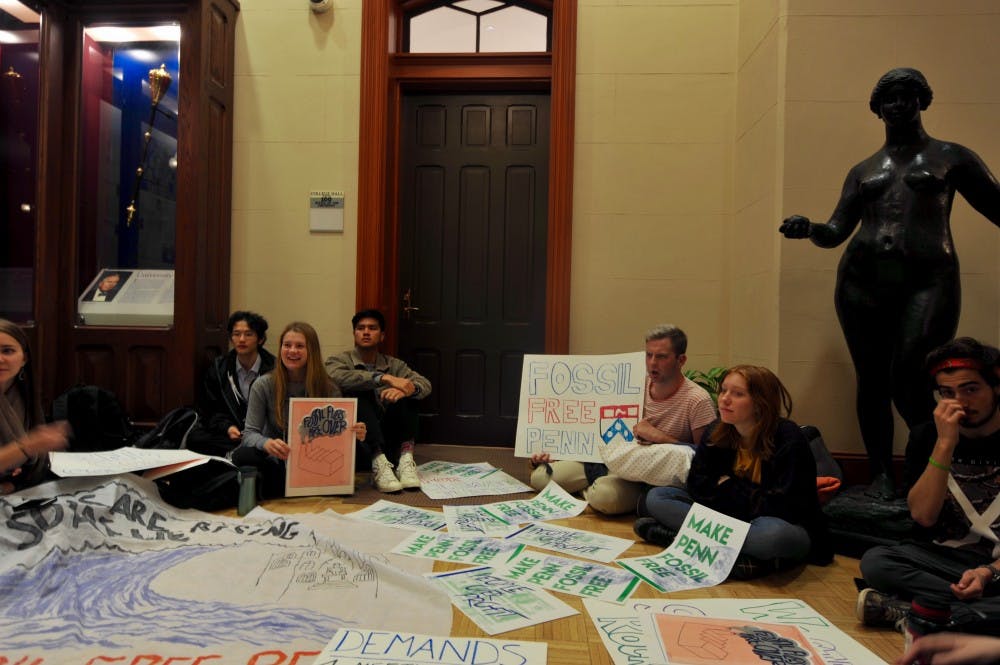
Students occupied Penn President Amy Gutmann's office in a sit-in Thursday morning, demanding greater transparency on the Trustee's decision not to divest from fossil fuels.
Credit: Luis Ferre SaduriniGROUP THINK is the DP’s round table section, where we throw a question at the columnists and see what answers stick. Read your favorite columnist, or read them all.
This week's question: What do you make of Fossil Free Penn's sit-in at College Hall last week? Does this set a precedent for how students should ask the administration for change?
James Lee | The Conversation
Martin Luther King Jr. once said, “The riot is the language of the unheard.” Clearly FFP’s behavior didn’t constitute a full-on riot, but the point that institutional change must sometimes occur through unrecognized means still stands. So I don’t particularly have a problem with how FFP conducted its protest, especially because it seems to have exhausted all other "legitimate" means of doing so. However, as I wrote before, I think FFP is perhaps being a bit unfair to Penn, in the sense that the moral burden that the organization is suggesting for Penn’s investments seems awfully high. I understand that in this case they were asking for things other than divestment, and I do think that the University ought to consider those things. Attribution of such indirect moral blame is always a tricky issue. Climate change is real and serious, but so are so many other problems, and for Penn to consider in each case the consequences of its investments seems harsh.
Cameron Dichter | Real Talk
The right to stage a peaceful sit-in is something all Penn students possess — it’s a staple of our commitment to free and open expression. Therefore, regardless of whether or not you agree with the stated goals of Fossil Free Penn, we should all be concerned about the oppressive tactics that the University used to stop their sit-in.
In an interview with the DP, College sophomore and FFP member David Zhao said, “They used [the sit-in] as a justification to shut down negotiations, essentially saying ‘well now you’re in bad standing because you’ve incurred these citations and we’re not really gonna talk to you.’”
If the only issue administrators had with FFP’s conduct is that their members stayed in College Hall after the building closed then why did they incur citations when they slept there on Wednesday night but not on Tuesday? Clearly the citations issued to members of FFP by the administration were less about following University protocol and more about silencing their dissent.
Shawn Srolovitz | Srol With It
How to engage with the administration is very dependent on the group and its goals. Every group has its own mechanism of doing things, and the issues of importance to each student group define the appropriate method for engaging with administrators. In the case of Fossil Free Penn, I do believe that the sit-in was a necessary way to bring the issue to the administration’s attention, and I applaud the work that the group has been doing to encourage Penn to divest.
Taylor Becker | Right Angles
Fossil Free Penn's sit-in at College Hall was only the most recent action of a desperate group's attempt to stay relevant.
Fossil Free Penn had its chance when it successfully delivered a student referendum to the Board of Trustees — Though their claim that nearly 90% of students supported the referendum is misleading, given that only 29% of the total student body actually voted in favor of divestment. The trustees listened and created a subcommittee to consider divestment. When Fossil Free's ideas lost the day, nevertheless they persisted.
FFP interrupted a University Council meeting by marching in and wearing surgical masks and they were angry that their demands were not immediately met. And that is what Fossil Free Penn has: demands.
Finally, FFP threw themselves on the ground of College Hall, demanding once and for all that the University do what they say. Unfortunately, as someone who has been on the Undergraduate Assembly for two years, I can say that this is not how policy change works. If only it were so easy to achieve your goals. By all means, fight for what you are passionate about. But this ought not set precedent for other student groups, because making demands is not the way to convince others of the merit of your ideas.
The Daily Pennsylvanian is an independent, student-run newspaper. Please consider making a donation to support the coverage that shapes the University. Your generosity ensures a future of strong journalism at Penn.
Donate




